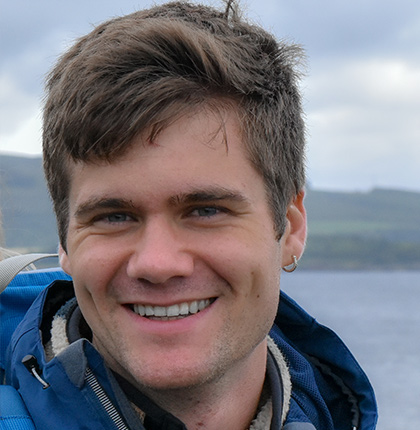An oceanic species in coastal habitats: Risso’s dolphin distribution in Scottish waters and implications for conservation management.
Risso’s dolphins generally occupy offshore habitats beyond the continental shelf, where they forage on neritic and oceanic squid. However, in the UK, and off western Scotland in particular, the species also exhibits a coastal distribution. This distribution means that they overlap with anthropogenic activities, and increases the risks of disturbance.
Risso’s dolphins are protected under various national and international regulations, and are a Priority Marine Feature in Scottish seas. In 2020, a Nature Conservation Marine Protected Area was established for the species off the Isle of Lewis (North-east Lewis MPA), representing an area with persistent high densities, and evidence that it may be used as a calving and nursing area.
This study seeks to improve understanding of the coastal habitat use by Risso’s dolphins. Understanding why Risso’s dolphins occupy coastal waters, when they are there, and what they are doing is key to quantifying risk and the importance of these nearshore areas. The results of this inter-disciplinary research will allow regulators to better monitor Risso’s dolphins, within and outside the MPA, and ensure their long-term conservation in Scottish waters, thereby promoting the sustainable progression of industries and economic growth in increasingly urbanised coastal seas around Scotland.
In recent years, the COMPASS (2017-2022) and SAMOSAS (2020-2021) projects have collected year-round passive acoustic monitoring data in Scottish coastal (6x) and continental shelf waters (10x), respectively. Building on these existing large-scale multi-year datasets, this project aims to:
- Develop an automated Risso’s dolphin click detector and classifier.
- Study the spatio-temporal distribution of Risso’s dolphin in coastal habitats.
- Investigate Risso’s dolphins foraging behaviour in coastal habitats.
- Explore potential habitat and geographic variation in Risso’s dolphin echolocation behaviour.
Supervisors
Dr. Nienke Van Geel, SAMS
Dr. Denise Risch, SAMS
Dr. Gordon Hastie, SMRU ()
Caroline Carter, NatureScot
Funder
NERC Studentships awarded to the SUPER Doctoral Training Partnership
University
University of the Highlands and Islands
Fieldwork experience
March – September 2017: Intern at the Bahamas Marine Mammal Research Organisation. Experience conducting surveys for cetaceans collecting ID Photographs, acoustic data, tracking animals and conducting necropsies in the field.
August 2018: Visual and acoustic survey onboard Take the Helm primarily to collect data on harbour porpoise distribution along the south coast of Cornwall, UK.
Training Courses
JNCC Accredited MMO Course – Intelligent Ocean
PAM Operator Course – Intelligent Ocean
Employment
2021 – 2022 - Project Manager - Seiche
2020 - Present - Acoustic Analyst - Freelance
Higher Education
2020 - MSc Marine Mammal Science, University of St Andrews
2018 - BSc (Hons) Marine Biology & Oceanography, University of Plymouth
Peer Reviewed Publications
Webber, T., Gillespie, D., Lewis, T., Gordon, J., Ruchirabha, T., & Thompson, K. F. (2022). Streamlining analysis methods for large acoustic surveys using automatic detectors with operator validation. Methods in Ecology and Evolution, 00, 1– 13. https://doi.org/10.1111/2041-210X.13907
